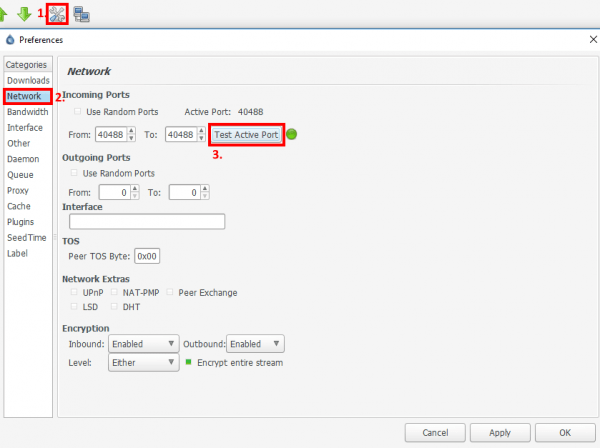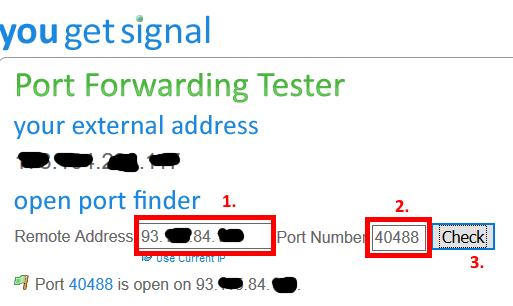 The next guide in our Auto Port Forward PIA VPN guide is for Deluge. We have already covered Transmission, but if you client of choice is the excellent Deluge client, then you will find all the required information here. A very nice features that Private Internet Access (PIA) provides is Port Forwarding on their P2P enabled VPN servers. If you are using a private tracker and you need to have decent upload to maintain your ratio, or if your want to download torrents with low number of seeds available, you will certainly benefit from using an active (open) port in your BitTorrent client.
The next guide in our Auto Port Forward PIA VPN guide is for Deluge. We have already covered Transmission, but if you client of choice is the excellent Deluge client, then you will find all the required information here. A very nice features that Private Internet Access (PIA) provides is Port Forwarding on their P2P enabled VPN servers. If you are using a private tracker and you need to have decent upload to maintain your ratio, or if your want to download torrents with low number of seeds available, you will certainly benefit from using an active (open) port in your BitTorrent client.
Most VPN providers don't allow port forwarding at all, even if they do, they charge extra for this feature or you can get port forwarding to work only using their proprietary application. Luckily, PIA has a very professional approach. With some script-magic, you will always have an active connection in your client, all this fully automated. When it comes to Split Tunnel VPN, things get more complicated since we need to handle iptables rules too, but we got that part covered too!
| VPN Service | ||||
|---|---|---|---|---|
| Private Internet Access | ($3.33 / month) | |||
| Pure VPN | ($4.91 / month) | |||
| IPVanish | ($6.41 / month) |
Benefits and Disadvantages of Port Forwarding
If you are using port forwarding, then you will have the following benefits:
- You will be able to connect to considerably more seeds/peers.
- Since you can connect to more seeds/peers, you will be able to download torrents with only few seeders, and probably at higher speeds.
- Others will be able to download from you
- You will keep the torrent live
- Maintain your ratio (especially important on private trackers)
- Some private trackers require you to be active (have port forwarding enabled).
- You keep all the benefits of using Split Tunnel VPN (selective traffic routing, Kill Switch), and you are still able to take advantage of the above listed benefits of running your torrent client in active mode.
The only disadvantage of port forwarding is having an open port in your firewall, which always carries some security risk (not only for torrent clients, but in general). In practice, this should be just a minor security risk, but as a rule, it is best to have as few ports open as possible. You should be fine if you are using the well known clients like Transmission or Deluge.
Note: since you are running over VPN server, your upload speed will be limited to the upload speed of the VPN server you use (exactly the same as with download).
Port Forwarding when Using VPN
Configuring port forwarding without VPN is really a 3 minute job: you just open the selected ports in your router (or enable UPnP in you router and torrent client), and if your ISP doesn't block torrent traffic or have all the ports closed, you are good to go. With VPN, and especially with Split Tunnel VPN, it is more complicated, but luckily a good VPN provider like Private Internet Access and our auto port forwarding script for PIA makes this process quite easy.
We always recommend protecting your privacy by using a VPN provider if you are using torrents. You can also take advantage of Split Tunnel VPN features, like selective traffic routing and Kill Switch with our guide. However, we would like to keep the torrents alive, and also help those who are using private trackers. If you are using a VPN connection for torrents, everything you download and upload is tunneled over the VPN provider's server in encrypted form. The open port is assigned by the VPN provider, in our case PIA, and it changes randomly to provide an additional layer of security.
Important: port forwarding is available on selected PIA servers, please check this link at PIA site for an up-to-date list of servers that support port forward.
How does the Port Forward for VPN Script Work?
- PIA will assign an open port for their p2p enabled severs with port forwarding enabled.
- This port number can change after you reconnect to the VPN server (not necessary, but possible), or even when you are connected to the server.
- The script will acquire the port number from the PIA server.
- If you are using Split Tunnel VPN, then we have strict iptables (firewall) rules enabled. The script will automatically open the reported port number in the firewall for vpn user (and close the unused port number).
- The script will update Deluge with the acquired port number, no user interaction is required.
- The script will be scheduled to run as a Cron Job at system boot and every two hours
- If the port number has changed when using Split Tunnel VPN
- Old port number will be removed from iptables to keep unused ports closed
- New port number will be opened
- Deluge will be updated with the new port number.
Configure Auto Port Forward PIA VPN for Deluge
Important: this script will work only with Private Internet Access, it will not work with any other VPN provider!
First you need to download the script from HTPC Guides GitHub
sudo wget -O /etc/openvpn/portforward.sh https://raw.githubusercontent.com/HTPCGuides/pia-port-forwarding-scripts/master/deluge-pia-port-forwarding.shNow make the downloaded script executable
sudo chmod +x /etc/openvpn/portforward.shNext step is to edit the script and add your PIA username and password and the Deluge Daemon username and password to the script.
Obviously you should know your PIA username and password. As for the Deluge Daemon, you might have one, if you have, for example, configured ThinClient already, or you need to create a new one now.
The Deluge Daemon username and password are stored in the Deluge configuration folder in the auth file.
- If you are NOT using Split Tunnel VPN, then the default location is
/var/lib/deluge/.config/deluge/auth - If you are using Split Tunnel VPN, then the default location is
/home/vpn/.config/deluge/auth
To add a username and password for Deluge Daemon when NOT using Split Tunnel VPN (replacing username and password with your choice)
sudo echo "username:password:10" >> /var/lib/deluge/.config/deluge/authTo add a username and password for Deluge Daemon when using Split Tunnel VPN (replacing username and password with your choice)
sudo echo "username:password:10" >> /home/vpn/.config/deluge/authNow that you have the Deluge Daemon username and password set, it is time to add all the credentials to the port forward script. Edit the script
sudo nano /etc/openvpn/portforward.shLocate the two line below, enter your PIA username and password instead of piauser and piapass
Important: if you are using special characters in your PIA password, then put the password inside quotation marks, like “piapass”
USERNAME=piauser
PASSWORD=piapassNext find the following two lines, and enter your Deluge Daemon username and password instead of user and pass (the one you already have or you have just created)
DELUGEUSER=user
DELUGEPASS=passHit Ctrl+X, Y, to Save and Exit.
Install Deluge Console
We need to install Deluge Console to be able to communicate with Deluge Daemon. The port forward script will set the port number in Deluge Daemon using the Deluge Console.
sudo apt-get update
sudo apt-get install deluge-consoleIf you are not using Split Tunnel VPN, then just skip the following section and go to Test Port Forward Script section.
Configure Port Forwarding for Deluge with Split Tunnel VPN
We assume you followed our guides for configuring Split Tunnel VPN for Deluge. Once you have Split Tunnel VPN with Deluge fully configured and working, and you followed this guide until this step, you need to enable Split Tunnel option in the Port Forwarding script.
Edit the script
sudo nano /etc/openvpn/portforward.shlocate this part
# set to 1 if using VPN Split Tunnel
SPLITVPN=""and enable Split VPN Port Forwarding by setting 1, should look like this
# set to 1 if using VPN Split Tunnel
SPLITVPN="1"Hit Ctrl+X, Y, to Save and Exit.
Next we need to make a modification to the Split Tunnel iptables script called by OpenVPN. You will need to modify one existing line and add a new line.
sudo nano /etc/openvpn/iptables.shLocate the following line
# allow responses
iptables -A INPUT -i $INTERFACE -m conntrack --ctstate ESTABLISHED -j ACCEPTand add RELATED to the rule, it should look like this
# allow responses
iptables -A INPUT -i $INTERFACE -m conntrack --ctstate RELATED,ESTABLISHED -j ACCEPTFinally, before the # reject connections from predator IP going over $NETIF line at the end of the script, insert the following line
iptables -A OUTPUT -m conntrack --ctstate RELATED,ESTABLISHED -j ACCEPTHit Ctrl+X, Y, to Save and Exit.
It should look like this, I highlighted the new line just added with red
iptables -A OUTPUT -m conntrack --ctstate RELATED,ESTABLISHED -j ACCEPT
# reject connections from predator IP going over $NETIF
iptables -A OUTPUT ! --src $LOCALIP -o $NETIF -j REJECTI recommend a system restart to make sure that the required iptables rules are properly loaded
sudo reboot nowTest Port Forwarding Script
With the VPN connection established and Deluge running, it is time to test the port forward script. Run the script manually
sudo bash /etc/openvpn/portforward.shThe output will be similar to this. The IP address is the IP address assigned to you by the VPN provider (your external VPN IP address) and the next line is the open port number on that server
5.152.xxx.xxx
40488
{"arguments":{},"result":"success"}If everything went well, you should have an open (active) port set in Deluge Daemon. There are two ways to check if the port number is really open or not. Deluge WEB UI doesn't have the option to check the port status, we will need to use Deluge ThinClient or a service by you get signal called Port Forwarding Tester.
Check Port Status with Deluge ThinClient
If you have Deluge ThinClient configured, then start Deluge and go to (1) Preferences.
Select (2) Network tab, and click (3) Test Active Port button. You should see a green dot as on the screenshot, that means you have successfully configured port forwarding and port is open.
Check Port Status with you get signal Port Forwarding Tester
If you don't have Deluge ThinClient configured, go to Open Port Forwarding Tester in your browser, and enter your external VPN IP address assigned to you by PIA under (1) Remote Address. Important: here you need to enter the VPN IP, it is the IP address that you see when you run the script. Next, enter the (2) Port Number returned by the script, and click (3) Check.
Note: under “your external address” you will see your real IP address, not the IP address assigned to you by PIA.
Configure Cron Job for Port Forwarding Script
Now that the you have checked that the script is working fine, it is time to configure a Cron Job that will run the script at system boot and every two hours. Since we don't know when the port number will change on a PIA server, Cron will run the script every two hours, and if the port is still the same, nothing will be done, but if the port number reported back has changed, the script will automatically update Deluge Daemon (and iptables if using Split Tunnel VPN).
We will run the script as root, create the Cron Job
sudo crontab -eInsert the following two lines at the end of the file
@reboot sleep 60 && /etc/openvpn/portforward.sh | while IFS= read -r line; do echo "$(date) $line"; done >> /var/log/pia_portforward.log 2>&1 #PIA Port Forward
0 */2 * * * /etc/openvpn/portforward.sh | while IFS= read -r line; do echo "$(date) $line"; done >> /var/log/pia_portforward.log 2>&1 #PIA Port ForwardHit Ctrl+X, Y, to Save and Exit.
Based on this Cron Job, the script will
- Run on each system startup with a delay of 60 seconds, this should give enough time for for VPN tunnel to initialize and Deluge Daemon to start
- Run every two hours
- Output of the script will be logged to
/var/log/pia_portforward.logfile, and we also added a timestamp to each line.
Configure Logrotate
Finally, we need to configure log rotation, to keep the log file at reasonable size. I use daily rotation with compression, and I keep 7 log files (which means seven days). You can adjust this to your liking.
Create the log rotation configuration
sudo nano /etc/logrotate.d/pia_portforwardand insert the following
/var/log/pia_portforward.log {
daily
compress
rotate 7
}Hit Ctrl+X, Y, to Save and Exit.

